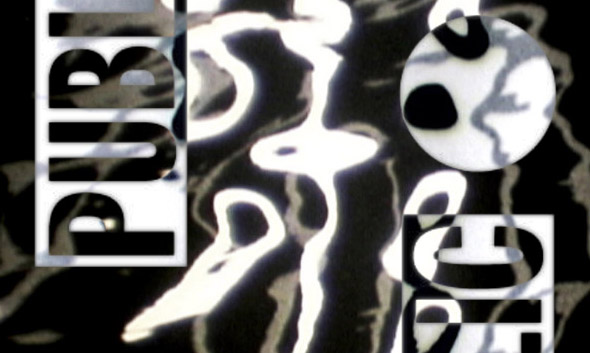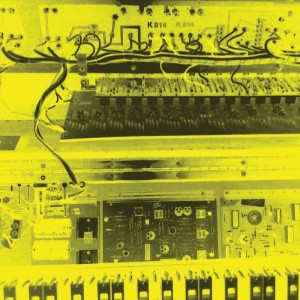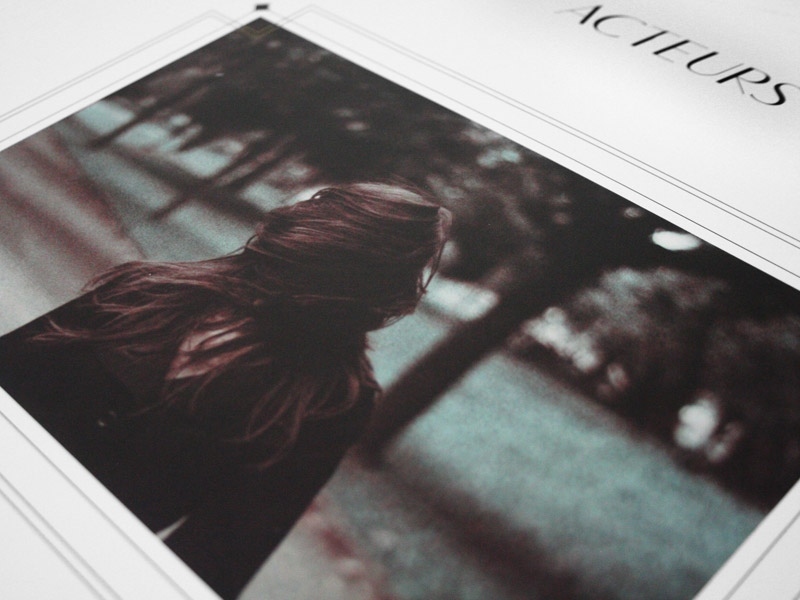“Banging gear and weird stuff that offends”: A discussion with Public Information
 Scott Wilson meets Alex Wilson and Lionel Skerratt, the pair behind one of the UK’s emerging labels in the increasingly crowded field of reissues and contemporary avant-garde electronics.
Scott Wilson meets Alex Wilson and Lionel Skerratt, the pair behind one of the UK’s emerging labels in the increasingly crowded field of reissues and contemporary avant-garde electronics.
The inspiration that comes to dictate someone’s musical direction can lie in the strangest of things, but for Alex Wilson, who runs Public Information with close friend Lionel Skerratt, it came in the rubbery sound waves made by the humblest of stationary items. “John Baker was one of the triangle of Radiophonic Workshop dudes alongside Delia Derbyshire and Daphne Oram – Trunk put out a release of his work, and this guy was my kind of year zero”, he reminisces. “There’s a little piece on it where he tells you how to make a track from a ruler – it goes twang, and he tells you how to break it down.”
I’m sitting with the pair in a noisy Camden pub as Wilson describes the moment where his interests started to turn to the early electronic music of the 1950s. Our meeting place is equidistant from the workplaces of both; Alex currently works in the British Library sound archive, while Lionel’s day job involves overseeing production and design at Warp Records, where the pair both originally worked met five years ago.Wilson doesn’t immediately seem the type you’d imagine to work in the nation’s foremost sound archive; originally from Hull, his exuberant, impulsive personality seems quite the opposite to Bradford native Skerratt’s quieter, more measured nature.
“I sit up in the wee hours and just go through really small blogs and work from their friend base – it’s the most exciting way for me really”
Over the past 18 months, the duo have built up Public Information to be one of the UK’s most interesting new labels, putting out releases of early electronic and library music alongside a growing discography of contemporary artists whose work ranges from sludgy post-punk inspired electronics, bleak sample-based anti-pop and alternate reality house music. “1950 – Tomorrow. New – Archive. Light – Dark” reads the label’s mission statement, and although Wilson feels it may have become somewhat “tired” since Public Information launched in September 2011 with an album of muddy analogue transmissions from Gatekeeper’s Aaron David Ross, it’s an apt way of approaching their diverse discography, which now stands at eight releases.
Following initial releases from ADR and Vancouver’s No UFO’s, whose Mind Controls The Flood EP provided a chaotic textural flux of noise and ambient music, Public Information put out their first reissue, a collection of tracks from forgotten electronic music pioneer F.C. Judd, a contemporary of Delia Derbyshire and Daphne Oram. Although it provided the label’s third release, it was being introduced to Judd’s work by filmmaker Ian Helliwell that initially gave Wilson the desire to start a label.
“I was pretty fresh to that early electronics thing, so I got in touch with him and we met up. It turned out he had this amazing knowledge of all these characters that I’d never heard of. I met him, and I went back home, and I thought, ‘lets Google some of these names’. And nowt would come up. That’s exciting in itself – I think that was a bit of a driver for the archive stuff, and the new stuff as well.”
 Wilson mentioned his idea for running a label to Skerratt a few years ago, and it became apparent that they could combine their knowledge to run a unique kind of imprint. “There was just so much stuff that I come across in a year at the library that I thought was well worth reissuing,” explains Wilson, “and thought, ‘we can do that”. Although it’s clear from our discussion that there are points where their musical tastes diverge, they’ve nevertheless developed a healthy working relationship; Wilson is primarily responsible for A&R, and Skerratt overseeing the design process and offering a sounding board for Wilson’s musical discoveries.
Wilson mentioned his idea for running a label to Skerratt a few years ago, and it became apparent that they could combine their knowledge to run a unique kind of imprint. “There was just so much stuff that I come across in a year at the library that I thought was well worth reissuing,” explains Wilson, “and thought, ‘we can do that”. Although it’s clear from our discussion that there are points where their musical tastes diverge, they’ve nevertheless developed a healthy working relationship; Wilson is primarily responsible for A&R, and Skerratt overseeing the design process and offering a sounding board for Wilson’s musical discoveries.
Unlike established archive labels such as Trunk and Finders Keepers however, the pair wanted to open the remit to new music as well. “While I come from a label (Warp) doing new releases,” Skerratt explains, “Alex is coming across super old recordings every day, cataloguing stuff like that, so it just kind of made sense that we’d take both of those worlds”. This collision of the old and new first made itself obvious with the release of Ekoplekz’s Dromilly Vale, an EP which used the concept of “an imaginary recording studio that is a cross between King Tubby’s on Dromilly Ave, Kingston, JA and the Radiophonic Workshop’s Maida Vale studio in London” as a way of channelling the Bristol producer’s very contemporary take on outsider electronics.
Although common threads can be found in the releases of Public Information and labels with a similar commitment to challenging experimental electronics, such as Spectrum Spools, PAN and Blackest Ever Black, Public Information’s approach is one that looks outside the individual musical zeitgeists these labels have all formed for themselves. It’s an approach that seems to come from a desire on both Wilson and Skerratt’s part to replicate the sense of wonder Wilson had when discovering Judd’s work, but with contemporary artists. Given the current propensity for dark, industrial techno, lo-fi synth music and hyper-processed electronics, it’s impressive that the pair seem to hit upon fresh music that both sits outside of these crowded niches as well as drawing from them in unique ways. As Wilson explains, his method for discovering most of this music is to utilise a similar method to Opal Tapes boss Stephen Bishop, challenging himself to find as much interesting, undiscovered music as he can on Soundcloud in a short space of time.
“He (Bishop) said something that really chimed with me”, Wilson explains. “I think he said in an hour he’d make a game of it to see what he could find, and you only have to look at the amount of stuff he’s broken through. Back when MySpace was kicking around, I used to find curious enjoyment in sitting on MySpace looking at who’s friends with which people. Now I sit up in the wee hours and just go through really small blogs and work from their friend base – it’s the most exciting way for me really.” It was though this approach that Wilson came across San Francisco-based producer Austin Cesear, whose Cruise Forever LP combined Basic Channel-style dub techno with atomic level sound design in the vein of Actress. Although it had much in common with the monochromatic electronic soup of the Ekoplekz and Judd releases, Cruise Forever provided a breakthrough moment for the label, opening up their discography to music more compatible with the dancefloor.
 By the point the Austin Cesear record was released it seemed clear that Public Information’s discography was starting to take on a life of its own, with a strange identity emerging out of what initially seemed a fairly disparate catalogue. Public Information’s name seemed to be unconsciously steering the path of its releases, developing a discography that feels at times like an imagined library rather than a record label. “It was quite carefully considered,” Skerratt says of the name, “and I think the way it sits well in hindsight in terms of what we’ve done over the past year. It’s got a kind of establishment kind of feel to it”. Wilson feels similarly: “Well that’s it, y’know, I love library music, the whole breadth of it, and the label does go from that angle – when I think about it that’s where we’re at.”
By the point the Austin Cesear record was released it seemed clear that Public Information’s discography was starting to take on a life of its own, with a strange identity emerging out of what initially seemed a fairly disparate catalogue. Public Information’s name seemed to be unconsciously steering the path of its releases, developing a discography that feels at times like an imagined library rather than a record label. “It was quite carefully considered,” Skerratt says of the name, “and I think the way it sits well in hindsight in terms of what we’ve done over the past year. It’s got a kind of establishment kind of feel to it”. Wilson feels similarly: “Well that’s it, y’know, I love library music, the whole breadth of it, and the label does go from that angle – when I think about it that’s where we’re at.”
Although it may be tempting to categorise Public Information alongside labels such as Mordant Music and Ghost Box, for which the aesthetic of British public information films is key to understanding their output of mythological narratives, with groundings in pseudo real-life situations such as Belbury Poly’s imagined village locale, there are no such overriding hauntological narratives running through its discography; rather, the pair try to tell an ongoing story from release to release. “It’s like we’re trying to piece something together,” Skerratt says, “like continuous stories. We’ll definitely be planning them, and there’s a story to how they all fit together”. “The Ekoplekz in my mind had to sit next to the FC Judd,” continues Wilson “because Ekoplekz was obsessed with FC Judd before he’d even put a record out. He was one of the few people who knew him – there’s all these kind of little links between stuff that really works for me.” Indeed, both the music on the Judd retrospective and Ekoplekz’s Dromilly Vale may have been separated by some sixty years, but the haunting, metallic, concrète of both make them ideal neighbours.
 Perhaps one of the most obvious aesthetic threads running through their discography has been the dark, atmospheric quality seen in the Judd, Ekoplekz and Cesear records. However, it would be wrong to suggest that the music of Public Information is simply music with an absence of melody, rather, it feels like music with the colour drained out to leave pockets of negative space. It’s best represented visually on San Francisco artist Paul Clipson’s rippling black and white cover for Cruise Forever, and aurally in Russian duo Love Cult’s Fingers Crossed, a bleak, sample-based collage of sounds that could almost be an alternate soundtrack to Tarkovsky’s Stalker.
Perhaps one of the most obvious aesthetic threads running through their discography has been the dark, atmospheric quality seen in the Judd, Ekoplekz and Cesear records. However, it would be wrong to suggest that the music of Public Information is simply music with an absence of melody, rather, it feels like music with the colour drained out to leave pockets of negative space. It’s best represented visually on San Francisco artist Paul Clipson’s rippling black and white cover for Cruise Forever, and aurally in Russian duo Love Cult’s Fingers Crossed, a bleak, sample-based collage of sounds that could almost be an alternate soundtrack to Tarkovsky’s Stalker.
“I like melody in most things” says Wilson, ”I did an interesting exercise at the weekend; Resonance FM had asked me to do a chronological mix of all our records, and even the darkest records ones we’d put out – Ekoplekz, and Love Cult maybe – I could feel pop figures, little tiny melodies”. It’s unsurprising that these cracks of light should appear every so often given Wilson’s appreciation of library music. Perhaps the most obvious example of their embrace of lighter sounds is the effervescent Tomorrow’s Achievements, a compilation comprised of library music from Toronto’s Parry Music library, whose unbridled positivity is perfectly represented by Jack Featherstone’s vivid, rainbow-like sleeve design. It’s something that Wilson also notes as having particular similarities to the ADR release, which although comprised of dense synth music in the vein of Oneohtrix Point Never’s early material, nevertheless has the drifting, wonderment-filled melodics of 80s library music.
This appreciation of something closer to pop music is something that the label – Wilson in particular – would like to explore in the future. This seems to have begun with their most recent release, the eponymous release from Chicago-based duo Acteurs. Although their Ike Yard-indebted post-punk electronics have a considerable degree of industrial atonality, the pair construct canny hooks in a similar manner to rising producer Powell, whose combination of post-punk basslines and searing noise combine into something surprisingly easy to digest. However, Wilson wants to go further with this direction, something borne out of his love of “jangly indie pop”.

“I’ve found myself getting more into dark stuff in recent years” Wilson explains, “but I’m ready for some songs I think, stuff that will uplift. The whole overriding journalistic angle at the minute is ‘we’re in bad times, we’ve got to listen to dark music’, y’know Thatcher mark II, all this shit – although I like that idea, I also like the idea of pop as a positive force.” Although he is cagey, Wilson reveals details of a singer he’s been in contact with whose music he hopes to release. “It’s good, it’s very pop. Very pop. It might alienate a few fans, but then again it might gain a few.”
It’s obvious from the way Wilson talks about “wanting to sing along to something”, that the pair have real ambitions beyond simply releasing more of what they’re currently known for, as Skerratt explains. “I quite like the idea of getting to this point where we like build a fanbase that’s not really expecting anything like that, and then to just throw something like that out there”. But it’s perhaps the shared experience they’ve had at Warp that seems to inform their pop ambitions. “Warp’s an interesting example,” says Wilson, “the way they’ve evolved to become a pop label – the way they go from Flying Lotus to Grizzly Bear to Autechre to Lidell, such is the music crowd out there at the minute, the Lidell fans are not going to buy your Autechre record. Generally, I kind of want to reach out to that wide spectrum.”
“I’m ready for some songs I think, stuff that will uplift. The whole overriding journalistic angle at the minute is ‘we’re in bad times, we’ve got to listen to dark music’, y’know Thatcher mark II, all this shit – although I like that idea, I also like the idea of pop as a positive force.”
Looking to the nearer future, the pair have a number of exciting projects planned which should see them continue to carve out a larger niche in the increasingly crowded landscape of leftfield sonics. Public Information will soon be announcing an album containing remixes of one their previous projects, with reworks from the likes of Chris Carter, Perc, Holly Herndon, Bandshell, and Leyland Kirby, which they hope will be accompanied with a label showcase and a 7” containing a “musique concrète chop up” of the tracks submitted. “It’s going be the first release, apart from the Ekoplekz record, where anybody will know the artists involved, so it’s going be interesting from a PR point of view” explains Skerratt.
The pair are also planning to release more 12”s devoted to more club focused music, put out with less fanfare than their larger projects, “just to punctuate the albums” as Wilson puts it. The first will come from IVVVO, who has previously released on Opal Tapes, and although a name with previous form, the Portuguese producer’s subdued melodies and spectral textures feel entirely at home on Public Information. “This could be the cold marketing ploy in me thinking ‘everyone likes 4/4 these days so let’s do it,” Wilson explains of the idea, “but no, I think it reflects the interests of both Lionel and I – we like going out and actually listening to dance music.” Cynical observers may see this move as an attempt to widen their appeal in a similar manner to a label like PAN, but its clear from the pair’s love of what Wilson refers to enthusiastically as “banging gear and weird stuff that offends”, that their fast growing library’s next set of additions will be just as respectful to its existing collection of sonic curiosities.
Interview by Scott Wilson